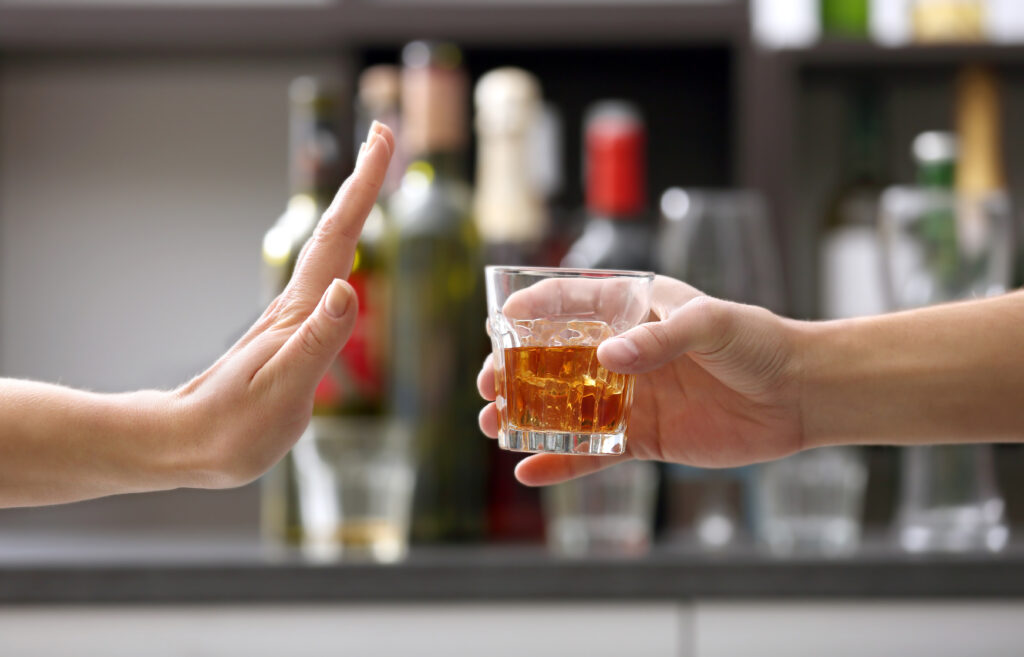What is the Best Way to Detox From Alcohol?

If you are struggling with alcoholism, it might be time you get help. But what’s the best way to detox from alcohol? Too often, people try to go cold turkey, getting through their withdrawal symptoms without help, but this regularly leads to relapse. Next Wind Recovery is a New Jersey outpatient rehab center. If you are interested in learning more about outpatient alcohol detox, contact us today. What Are Common Alcohol Withdrawal Symptoms? Alcoholism brings with it a wide range of withdrawal symptoms, some of which society lightly brushes off as the quintessential “hangover” feelings, but others that can be much more severe. 6 Hours Within the first six hours following your last drink, you will experience mild to severe symptoms that include: Insomnia Anxiety Headaches Nausea Sweating Shaking 12-48 Hours After that, all of these same symptoms can get much more severe. But you can also experience hallucinations and seizures. 48-72 Hours The final phase is the most dangerous. You will experience a fever, heavy sweating, confusion, and high blood pressure here. In about 5% of cases, alcohol withdrawal symptoms can result in delirium tremens, including delusions and hallucinations. What Does an Alcohol Detox Program Entail? An alcohol rehab in New Jersey begins with an assessment, after which you start your detox from alcohol under supervision to manage your alcohol withdrawal symptoms. Assessment During your initial assessment, the professionals at an alcohol detox center will ask basic questions about your alcoholism, how much you normally consume, how often, and what other substances you take. Understanding your history of substance abuse, mental health, and physical health will prepare the staff for the most effective alcohol detox program. Alcohol Detox Program Once you are ready, you check in at a North Jersey alcohol rehab center and start your detox from alcohol. This is the most dangerous time because it brings with it a serious risk of health complications like delirium tremens. With an alcohol detox center, you get 24-hour supervision from medical professionals who can provide you with over-the-counter and prescription medications as necessary to alleviate the severity of your withdrawal symptoms. Alcohol withdrawal symptoms, as mentioned, can be incredibly painful, uncomfortable, and potentially harmful to your overall health. Professionals at a Northern Jersey alcohol detox center can, for example: Give you an IV to help regulate your fluids and prevent you from getting dehydrated Provide over-the-counter anti-nausea or pain medications to control things like muscle spasms, headache, fever, nausea, and vomiting Monitor your symptoms and adjust your medications as needed Aftercare After completing your alcohol detox program, you can start the long-term aspect of your rehab with inpatient or outpatient care programs at the same North Jersey alcohol rehab center. What is the Best Way to Detox From Alcohol? The best way to manage your alcohol withdrawal symptoms is to work with a New Jersey alcohol rehab center for your detox. Medication-Assisted Treatment Medication-assisted treatment is the best way to detox from alcohol. This type of alcohol detox program involves not just supervision and medication management during your initial withdrawal symptoms but to help you manage ongoing cravings. Contact Next Wind Recovery to learn more about our medication-assisted treatment in New Jersey. For example, many FDA-approved medications to manage ongoing cravings change how your body responds to alcohol, so you no longer get the same happy drunk feeling, or alcohol consumption might make you violently ill. These changes can help you modify the way your brain might otherwise positively view alcohol consumption. Ongoing Rehab Getting through your withdrawal symptoms is only the first step. The best way to detox from alcohol is to transition from your detox program into ongoing rehabs, like inpatient or outpatient programs which include group therapy, individual therapy, and 12-step programs. How to Find Alcohol Detox Programs in North Jersey If you are ready to get help, turn to Next Wind. Our North Jersey alcohol rehab center offers a comprehensive alcohol detox program complete with medication-assisted treatment to manage your alcohol withdrawal symptoms and ongoing cravings, group therapy, individual therapy, and 12-step programs. Contact us today to learn more about our addiction treatment programs in New Jersey.
Is Medication Assisted Treatment Effective?

If you or someone you love is struggling with opioid addiction or alcoholism, it might feel like some form of rehab isn’t enough. Those who have an opioid or alcohol addiction and don’t get MAT have the highest relapse rates and relapse within the first year of treatment. But with MAT, you can treat not only the symptoms of withdrawal, but ongoing cravings, mood swings, and other mental health struggles that lead to a relapse. This blog will explore the question, is medication-assisted treatment effective and how to find programs near you. What is the Purpose of Medically Assisted Treatment? Medication-assisted treatment is a form of rehab that combines FDA-approved medications with traditional therapy. With medically assisted rehab, you get ongoing medications that either block the effects of drugs or relieve the withdrawal symptoms. This type of medically assisted treatment is best for addictive substances like opioids and alcohol. Alcohol and opioids are the most addictive substances today, posing a serious health risk to society. Both have a significant biopsychosocial impact. Opioids, for example, have the highest levels of cravings and are related to the lowest levels of self-efficacy and perceived criticism among users. Alcoholism without MAT leads to higher levels of being unemployed, single, and with a criminal record. In both groups, the most common reason people relapse within the first year is just to put themselves in a better mood. Is Medication Assisted Treatment Effective? With that in mind, medically-assisted treatment is more effective because it targets the biopsychosocial effects, controls the cravings with medications, and boosts things like self-efficacy and mood thanks to ongoing therapy. According to the PEW research center, medically assisted rehab is significantly more effective than medication or therapy alone. The combination of FDA-approved medications and therapy increases your chances of full recovery. These medications can reverse changes to the brain’s reward system, while therapy can help provide more effective coping skills. Moreover, those struggling with opioid addiction are more likely to overdose and experience a fatal overdose without access to medically assisted treatment. Why is it Necessary to Receive MAT at a Professional Rehab Center? It would help if you used a MAT rehab center for your medication-assisted treatment because the medications used are FDA-approved prescription medications. You cannot get these medications at your local grocery store or order them online. Only medical professionals can administer them, monitor your recovery, and modify your dosage as necessary. The medications administered as part of MAT are also provided during your initial detox and as part of your ongoing therapy. The use of the FDA-approved medications legally requires you to complete ongoing therapy at the same time. You cannot get the prescriptions for MAT without attending individual and group therapy sessions, something that your therapist and counselor have to report back to your doctors and the government. Finding Comprehensive MAT in North Jersey If you are to get help at a MAT rehab center in North Jersey, come to Next Wind. Our medically assisted rehab program helps you manage your pain and cravings. Getting through the first few days of your withdrawal can sometimes be the most difficult part. With our medication-assisted treatment, we can help you manage mood fluctuations. Instead of living with a perpetually bad mood and reverting to drugs or alcohol to feel good, we can help you reduce the euphoria you get from opioids or alcohol so that a relapse is a less attractive option. We also help avoid substituting one type of drug with another by integrating medications like Naltrexone into our medically assisted treatment. We know how hard it can be to function without drugs and alcohol after an addiction, but our caring team is here to help increase your chances of success with MAT and ongoing therapy. Contact Next Wind Recovery today to learn more about our New Jersey outpatient rehab.
How to Find a Job After Rehab

Recovering from substance abuse is a lifelong challenge, and many people find obstacles along their path to sobriety. One of the most common obstacles is how to find a job after rehab. There are many obstacles to finding employment, but there are just as many tips for getting a good job after rehab. If wondering how to find a job after rehab ends, Next Wind Recovery can help. Next Wind Recovery is a drug rehab in New Jersey. Contact us today to learn more about our New Jersey addiction treatment programs. Why Can it be Challenging to Find Work After Rehab? Finding a job after rehab can be challenging for many reasons: Sometimes people have a criminal history, the result of substance abuse, and that criminal history can limit the number of jobs that are available. Sometimes the barriers include gaps in employment history because of multiple stints in jail or rehab facilities, which can make finding employment after rehab impossible for companies who want to see stable employment histories. Sometimes people have financial complications, so finding employment after rehab can be difficult if any job requires things like background checks, criminal history checks, or credit checks. Other times there are technology or skills gaps, limited education, or just the stigma of working in recovery. Another way in which it’s a challenge is that some people are working in recovery. They are still attending meetings or going to therapy, so they need job opportunities that facilitate flexible work schedules while still offering full-time employment. Tips for Getting a Job After Rehab When you start looking for a job, know that you might face setbacks, which might not happen immediately, and you might very well face many “no’s” before you find the right “yes.” But with time and dedication, it can happen. Use available employment services. Many facilities and rehab programs help you transition back to daily life by obtaining higher education, child care, transportation, and employment. Good rehab facilities will be happy to help you with connections to local job opportunities or even help you with things like writing a resume. Don’t be afraid to ask around. Too often, people try to handle problems like finding a job after rehab on their own, but you shouldn’t be afraid to ask anyone and everyone in your personal network about any employment opportunities they might know of. Ask your doctor, your therapist, your counselor, people in your support group, your friends, or your family. Even if they can’t offer you an immediate, long-term job, they might be able to offer something short-term to get you back on your feet or point you in the right direction. Use online resources. Websites like America in Recovery are online job search resources specifically for people in recovery. Jobs posted on these websites are done so by employers who are already aware of the fact that their candidates are working in recovery, so you don’t have to struggle with disclosing your substance disorder or not. Are There Employment Services For People in Recovery? Yes! The government offers employee assistance programs to help in finding employment after rehab. Other prominent services include Recovery Through Entrepreneurship. Finding a job after rehab usually only means low-level or entry-level positions. That is why this organization specializes in multi-week programs that give you the financial, business, networking, and digital skills you need to start your own business. People who have overcome addiction or mental health disorders might need more flexible work schedules or a chance to work independently without some of the confinement of traditional employment. What’s more, people who have struggled in this way might have unique insight into an area of business that is in demand but not yet being fulfilled by other companies. Organizations like Jobs, Friends & Houses give people actionable skills by renovating properties and flipping them. Working with this organization gives you a chance to start an apprenticeship and obtain skills that you can use for a legitimate, long-term career. How Does Next Wind Recovery Help People Find Jobs After Treatment? Next Wind helps people in recovery with comprehensive aftercare programs. We understand that aftercare services shouldn’t be limited to ongoing group therapy. That is why we offer help finding employment after rehab, increasing your viable skills, getting help with ongoing education, and much more. Contact Next Wind Recovery today to learn more about our programs and aftercare services in New Jersey.
What Are the Anti-Craving Medicines Used in MAT?

Studies show that individuals with an opioid use disorder (OUD) who attempt total abstinence following detox are significantly more likely to relapse than individuals with other addictions. Relapse is a normal part of the recovery process. However, relapsing on opioids carries a higher risk for fatal overdoses. Because of the power of opioids, individuals with OUD often detox and relapse multiple times. Each time, it can be more dangerous. One highly effective way to combat this is incorporating medication-assisted treatment (MAT) in New Jersey into comprehensive addiction treatment. While many believe that MAT simply substitutes one addiction for another, at Next Wind Recovery, we know that these FDA-approved anti-craving medications are a critical component of successful and lasting recovery from opioids and alcohol. Find out if MAT is appropriate for you by calling us at 201.331.6569. What Are the Anti-Craving Medications Used in MAT? Medication-assisted treatment is an evidence-based treatment, meaning that its effectiveness has been proven in clinical trials. MAT is promoted and supported by public health agencies, including the National Institutes of Health (NIH) and the American Medical Association (AMA). Despite this, it remains highly controversial. Helping more people secure MAT means working to break the stigma associated with some of the medications used. Anti-Alcohol Craving Medications Because alcohol is legal and such a part of American culture, many people do not understand the severity of alcohol addiction. Alcohol withdrawal symptoms can be severe and even life-threatening. Particularly in severe cases of alcohol addiction, MAT is essential. The medications used include: Acamprosate – This unique drug does not eliminate withdrawal symptoms but helps people avoid alcohol after they quit drinking by stabilizing the chemical imbalances caused by alcohol addiction.Disulfiram – Also used after detox, this drug changes how the body eliminates alcohol, causing side effects such as headache, nausea, and vomiting if alcohol is consumed. Anti-Craving Medications for Opiates Opioid addiction quickly causes significant changes in brain and body chemistry that result in extreme psychological and physical cravings. When these powerful drugs leave the system, intense withdrawal symptoms set in quickly, a feeling known as “dope sick.” Those addicted to opioids repeatedly return to their drug of choice to avoid these intense withdrawal symptoms. MAT medications that help include: Buprenorphine – Taken as directed, this drug significantly reduces opioid dependence by reducing and suppressing opioid cravings and limiting withdrawal symptoms. Methadone – This drug reduces the cravings for opioids and can block the effects that opioids have on the body. Much like using the patch to quit smoking, methadone is used to help titrate down from opioid addiction. The Benefits of Naltrexone in MAT Naltrexone is approved by the Food and Drug Administration (FDA) to treat both alcohol use disorder (AUD) and opioid use disorder (OUD). Contrary to popular belief, Naltrexone is not an opioid. It is also not addictive and does not cause withdrawal symptoms when it is stopped. Naltrexone blocks the euphoric and sedative effects of opioids and alcohol, reduces cravings, and helps prevent relapse. Naltrexone can only be used following detox when there are no traces of alcohol or opioids in the system. Individuals who drink or use opioids while taking Naltrexone will experience severe side effects. Contact Next Wind Recovery for Medication-Assisted Treatment Medication-assisted treatment for addiction recovery is a highly effective but significantly underused approach to treatment. MAT is often mistakenly viewed as substituting one addiction for another. At Next Wind Recovery, we are dedicated to helping reduce the stigma of medication-assisted treatment. We do this by providing constant support and guidance for clients participating in MAT to ensure their medications remain at a therapeutic level. We understand that the fear of going through withdrawal often prevents people from seeking treatment for alcohol or opioid addiction. MAT can make the detox process more tolerable and reduce the risk of relapse. Contact Next Wind Recovery at 201.331.6569 if you have questions about medication-assisted treatment or want to find out if MAT can assist you in your recovery.
What to Expect from Outpatient Addiction Treatment

Millions of people suffer from substance use disorders (SUD). Treatment for substance use disorders generally falls into inpatient or outpatient care. Inpatient rehab is intensive, 24-hour supervised treatment in a residential setting. Outpatient rehab is a part-time treatment option that enables individuals to receive substance abuse treatment while maintaining regular daily routines. Not everyone struggling with SUD either needs or can attend inpatient treatment. Next Wind Recovery provides outpatient addiction treatment in New Jersey. At Next Wind Recovery, we have seen the impacts of opioid and alcohol addiction in our community and are dedicated to helping as many as possible achieve lasting recovery. Whether you are just beginning your recovery journey or just need extra support during a difficult time, we offer multiple levels of care to meet your needs. Call us at 201.331.6569 or use our online form to see if our outpatient rehab services are right for you or your loved one. Is Outpatient Addiction Treatment Right for You? Choosing the best program can feel overwhelming with so many treatment options available. Additionally, most people have difficulty accurately assessing their substance abuse or addiction level. Compared to inpatient rehab programs designed to provide the highest level of care to those with more severe addictions, outpatient rehab programs are more flexible and often more accessible. Outpatient addiction treatment is ideal for: Mild to moderate substance abuse or addiction Individuals with a lower risk of severe withdrawal symptoms Those who cannot afford inpatient treatment Individuals who cannot leave family, work, or school obligations Individuals who have a stable living situation and a strong support network Transitioning from a higher level of treatment Those who have relapsed or otherwise need continuing support Like all programs at Next Wind Recovery, our outpatient rehab center focuses on providing integrated care through holistic and evidence-based treatment practices to create a treatment plan designed to meet each client’s individual needs. Your schedule in outpatient rehab will be based on your needs, as assessed by our highly-skilled treatment team. What to Expect in Outpatient Addiction Treatment Deciding to stop using drugs and alcohol is the first step toward a healthier future. Often, an individual’s substance use causes disruptions in life, but overall they can function well enough to get by. Other times, substance use disorders are less noticeable, and individuals silently struggle to control their drug and alcohol use while appearing to be okay to those around them. The effects of substance use disorders are unique to each person and their circumstances. Choosing the best treatment starts with understanding what will work best for you and your individual needs. Outpatient programs in New Jersey usually offer the same treatments and therapies as inpatient drug rehab but in a less restrictive environment. Following are some of the evidence-based approaches we offer at Next Wind Recovery: Cognitive-behavioral therapy (CBT) Dialectical behavior therapy (DBT) Eye movement desensitization and reprocessing therapy (EMDR) Motivational interviewing (MI) Medication-assisted treatment (MAT) Individual counseling Group therapy A significant number of people who struggle with substance use disorders also have one or more mental health disorders such as anxiety, depression, or PTSD. At our New Jersey outpatient rehab center, we know the importance of providing treatment for co-occurring disorders. Contact Next Wind Recovery for Outpatient Programs in New Jersey For outpatient rehab to be successful, you or your loved one must be motivated to achieve recovery and commit to the process. Our team of compassionate addiction specialists will work with you to develop an individualized treatment plan to meet your needs and goals for recovery. Our fully licensed treatment team of doctors, nurses, and counselors is one of New Jersey’s best. At Next Wind Recovery, we understand that scheduling can be difficult, so we accommodate your busy schedule by offering individual and group sessions seven days per week. Further, we keep our client-to-staff ratios low to ensure each of our clients receives the personalized care they need and deserve. Contact us today at 201.331.6569 to learn more about how our outpatient addiction programs can help you or your loved one.
Outpatient Addiction Treatment Timeline

Detox is the first step toward recovery from drug or alcohol abuse and addiction. Choosing the best detox program depends upon your unique needs and the severity of your substance use disorder. Withdrawal symptoms are different for everyone and are determined by the type of substance, length of use, and amount in your system upon arrival at detox. Withdrawal from alcohol and opioids can be dangerous and sometimes even life-threatening without medical supervision. Therefore, it is critical to understand the detox process and the differences between inpatient and outpatient detox programs. Contact Next Wind Recovery at 201.331.6569 for detox and outpatient addiction treatment in New Jersey. Do You Need Outpatient Detox in New Jersey? It can be difficult for individuals struggling with a substance use disorder (SUD) to recognize when professional help is needed. Many people are in denial about their problem, especially when they have not yet experienced significant consequences resulting from their SUD. The reality is that most people abusing alcohol or drugs will eventually develop an addiction. If you question whether or not you need SUD treatment, you likely do. While the signs and symptoms of substance abuse and addiction will vary between individuals, the following are common indications that professional treatment is needed: Increasingly needing to take more of the substance to get the desired effect Experiencing withdrawal symptoms when not drinking or using drugs The inability to stop using drugs or alcohol despite repeated attempts Reliance on drugs, alcohol, or both to cope with anxiety, depression, stress, or any emotional or psychological challenges Avoiding responsibilities and withdrawing from previously enjoyed activities Obsessing over when you can next get and use drugs or alcohol or being afraid of not having access to your substance of choice Changes in appetite, sleep patterns, and physical appearance The main goal of detox is to address the physical aspects of addiction so that individuals can deal with the underlying psychological factors contributing to their SUD. Fear of this process doesn’t have to hold you back. At Next Wind Recovery, our outpatient detox center provides supportive, medically supervised care to help you through this challenging time. How Long Do Outpatient Detox Programs Take? One of the first questions most people want to be answered about addiction treatment is how long it will take. It is essential to accept that addiction is a chronic disease, so the process of recovery is lifelong. Having patience is critical to being successful in treatment and beyond. Remember, your addiction did not happen overnight, and neither will your recovery. A complete outpatient detox typically takes about six days but can range anywhere between three and fourteen. How long outpatient detox programs take depends on several factors, including: Which substance you are abusing Whether or not you are abusing multiple substances Method of use (injecting, snorting, smoking, etc.) Length and severity of substance abuse Medical history and general health Presence of co-occurring mental health disorders Age and gender Outpatient detox programs are generally less expensive and more convenient for many. Not everyone with a substance use disorder requires inpatient treatment. Further, not everyone can walk away from work, school, or family obligations to attend inpatient treatment. Outpatient addiction treatment allows you to remain employed and fulfill your responsibilities. That said, outpatient detox and subsequent addiction treatment are not appropriate for individuals with severe addiction. Additionally, because you are not in a controlled environment, the chances of relapse are higher. The best candidates for outpatient treatment will have a stable home environment where others are not using alcohol or drugs and a solid support network. Reach Out to Next Wind Recovery for Outpatient Detox and Addiction Treatment in New Jersey When you reach out to Next Wind Recovery for outpatient detox and addiction treatment services, the first step will be a thorough assessment from our highly-skilled, compassionate treatment team. This assessment will form the foundation of your individualized treatment plan. We understand the fears surrounding the decision to seek addiction treatment, but Next Wind Recovery will be with you every step of the way, from detox to aftercare planning. Reach out to us online or by calling 201.331.6569 to learn about your addiction treatment options.
